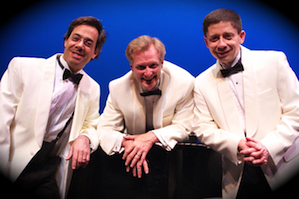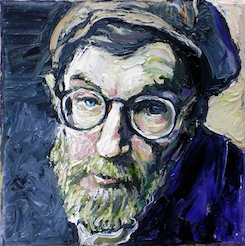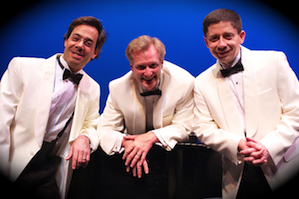
Photo by Sterling Hancock
We find it genuinely interesting that a format invented in the 1700s still turns out to be highly useful in the 21st century. Old Haydn was really onto something when he pioneered it, and we think that "something" is nothing more than story telling.
Speaking for the Saint Michael Trio, Russell Hancock is explaining "a unique ‘informance’ showcasing classical music at its most fun." Opening the season for Humanities West on Sept. 19, the program is "Rockin’ the Sonata," the first concert in the organization's illustrious 31-year history of lectures.
Both Franz Joseph Haydn (1723-1809) and Paul Schoenfield (b. 1947) are highly formal in their sonata form. Yet Haydn’s classical sonatas embodied the formalism of the 18th-century Enlightenment, while Detroit native Paul Schoenfield’s Café Music (1987) anticipates and expresses the whimsy and energy of a 21st-century urban metropolis.
Performance and narration are interwoven at the evening by the trio who "demonstrate with passion, wit, and their own virtuosity how two utterly different composers use the same tools to express the sentiment of their age."

Portrait by Justin Pearson
Of the sonata, Hancock goes on to say:
This form, with its very predictable components, Haydn was really doing the same thing that later become so familiar and popular in Walt Disney films or corny situation comedies. You always know what's going to happen, you always know its formulaic, and yet you like it anyway. The formula really works and it's still working in the hands of a very modernist and contemporary composer like Paul Schoenfield, who we think is telling the story of the 21st century metropolis.
The unusual ensemble is said "to go about balancing a life in the material world with a commitment to the arts ... three men who thrive in entrepreneurial careers and 'Rock the Sonata'."
- Violinist Daniel Cher won a music prize at Stanford University and his concerto appearances include the Orchestra New England and the New Haven Symphony. A medical doctor, he designs and implements clinical trials for Bay Area medical device companies.
- Cellist Michel Flexer performed frequently with the Palo Alto Chamber Orchestra. As a student at Harvard he studied with Bernard Greenhouse at the New England Conservatory. A software engineer and a serial entrepreneur, he has worked most recently with C3, Gain Technologies, and Siebel Systems.
- Pianist and lecturer Russell Hancock has appeared as concerto soloist with symphonies throughout the United States and his worldwide appearances include recitals from Taipei to Tapachula, Mexico. A member of the public policy faculty at Stanford, he is president and CEO of Joint Venture Silicon Valley.
Established in 2007, the trio performs classical works, jazz, and even rock, and their hallmark is mixing all of it in the same concert. In 2008, "Saint Mike" — their reference, not mine — was named artists-in-residence at Menlo College, two years later became affiliated artists at Notre Dame de Namur University, and were installed as anchors in the Villa Chamber Series at Montalvo Arts Center.
In 2012 they began a partnership with Stanford University, appearing to sold-out crowds at Dinkelspiel Auditorium where they deliver their trademark "informances" exploring classical composers in depth.
Even without referring to insurance magnate/composer Charles Ives as a patron saint, Hancock explains the duality of their work:
People are always intrigued to learn that we aren't full-time artists, and that we lead professional lives in the private sector. We don't think it's a big deal. All three of us thought the music would be more satisfying if it wasn't the only thing, and it actually has been. But we don't want people to look at us as a novelty. When we take the stage we're holding ourselves to the highest standard of the music industry and want to be judged that way.

